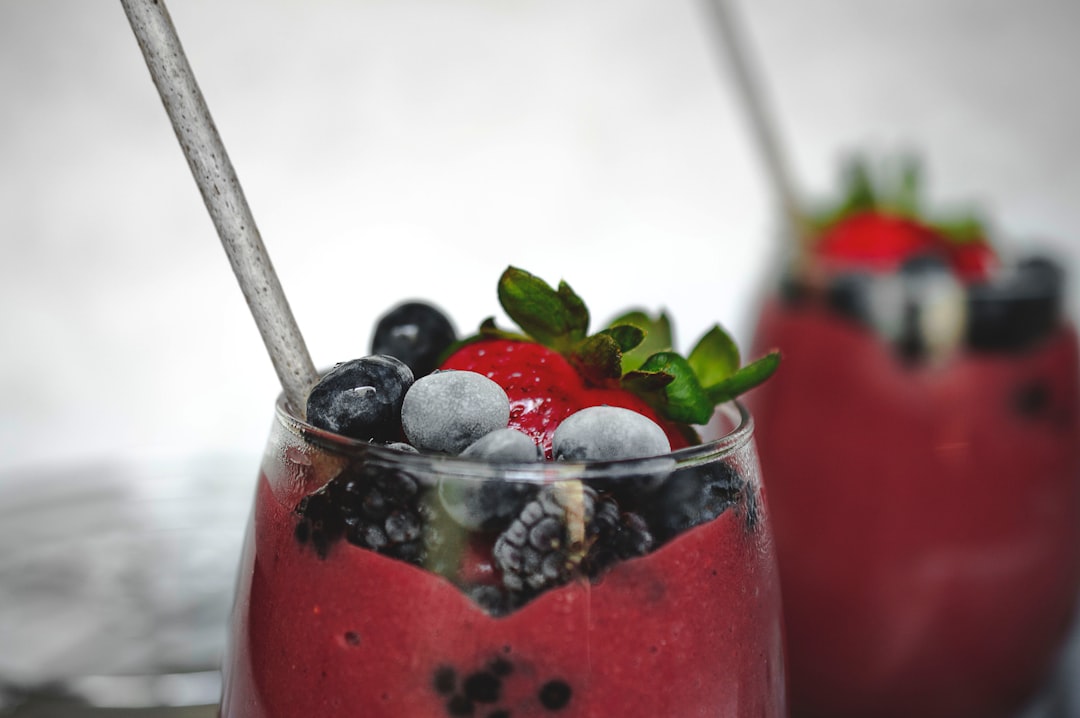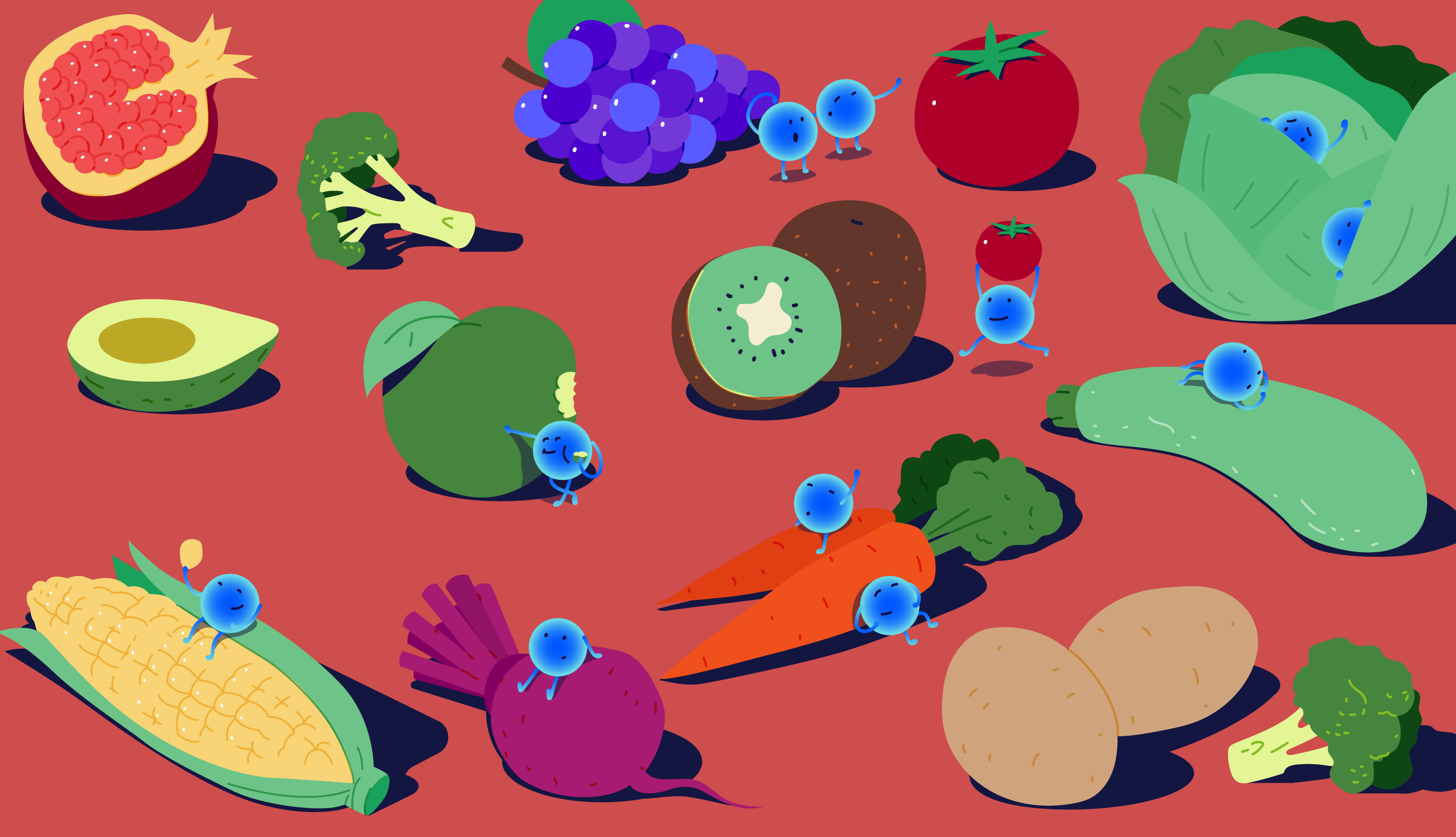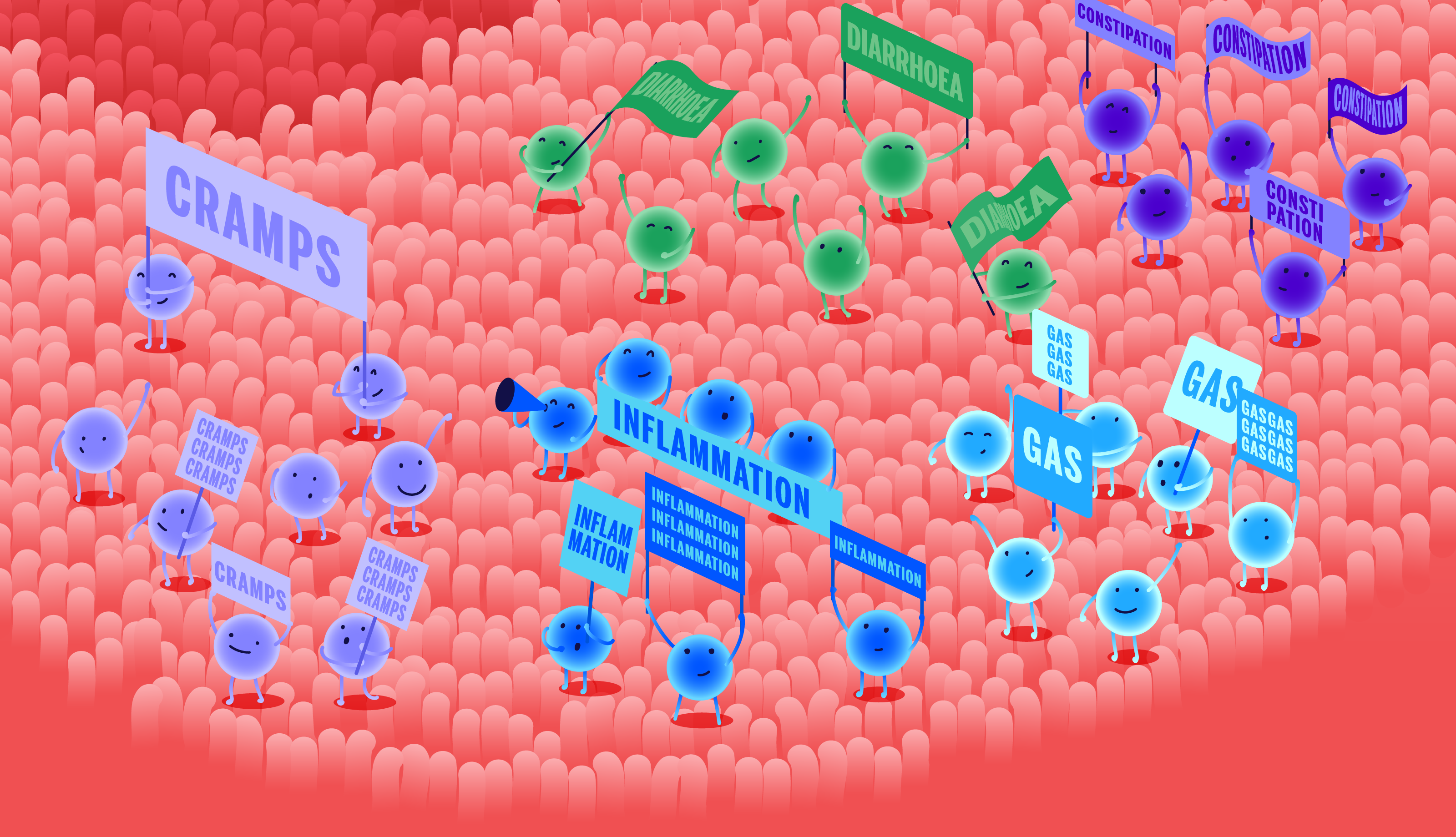When you’re pressed for time, cooking is often not an option but fast food can take a toll on your gut microbes and your immune system.
Fast food, served hot - it’s cheap, it’s convenient, and it fills us up after a long day, when we’re too tired to cook. It’s no surprise that fast food has become ubiquitous as it slides so easily into our modern lifestyles.
Table of contents
- Is healthy fast food really possible?
- Fast food, the gut microbiome and immune health
- How to make good fast food choices
- How to choose the healthiest fast food?
- Is low calorie fast food better for you?
However, new findings are emerging every week about the gut microbiome, and the relationship between fast food and the microbes that live in harmony with us. These insights highlight how fast food may be damaging to our gut health, and to our bodies in general, in more ways than previously thought.
Is there healthy fast food?
A healthy gut is nourished by fibre, which we consume in our foods but cannot break down ourselves. Bacteria that live in our gut rely on this fibre as a food source, breaking it down to produce a range of beneficial molecules for us.
In short, it should be pretty bad for our gut. Many fast food restaurants are now beginning to offer healthy fast food options as part of their typical menus. Read more to find out about how fast foods affect the gut, and what we can do to make healthy fast food choices.
Fast food, the gut microbiome and immune health
A high-fat and high-calorie diet negatively alters the gut microbiota by increasing the levels of bacteria associated with obesity, and reducing our overall gut bacterial diversity. Greater diversity is a trait associated with a healthy, plant-rich diet, whereas low diversity is associated with overweight and obesity.
Fibre, or lack thereof
There are many different types of fiber, several of which provide fuel for beneficial bacteria that produce molecules known as short-chain fatty acids (SCFAs). These molecules help prevent inflammation and are also a source of energy for the cells of your gut lining. Here, they enhance the production of mucus by cells lining our gut, which also protects against inflammation.
The fats in fast food
There are several different types of fat and they have different effects on human health.
Some fats are considered good for your health, like those in oily fish, olive oil and nuts. Saturated fats from red meat are okay in moderation, but excess consumption should be avoided.
Also known as partially hydrogenated oils, trans fats are present in fast food, especially french fries and fried chicken options. While the body uses other fats in its daily functions, it has no need for trans fats. Instead, they can actually induce inflammation.
Trans fats – that occur in small quantities during deep frying or by chemical invention – are a particularly large source of concern and have been directly linked to several serious diseases: cancers, diabetes type II, obesity and heart disease.

When fiber takes a back seat to fats (and meat), it can alter the gut microbiome by inducing local inflammation, affecting immune cell function, and changing the levels and proportions of different microbial species in our guts.
In short, when there is too much (unhealthy) fat – whether your diet contains fiber or not – the balance shifts towards chronic immune activation. The imbalance between excess fat and protein intake also has a more visible consequence: constipation.
More fat, more sugar, more inflammation
New research from the University of Bonn observed this occurring in mice that were fed a high-fat, high-sugar “Western” diet for a month compared to mice on a typical cereal diet. Mice on the “Western” diet developed a strong immune response throughout their body, with high levels of immune cells detected in their blood.

The researchers found that these high-fat, high-sugar food options were detected by a molecule known as the inflammasome that activated genes, which resulted in the increased production of immune cells. These genes were responsible for long-term, rather than short-term, immune activation.
So, even though short-term inflammation went away as soon as the mice were switched to a healthy diet, the long-term genetic changes remained switched on four weeks after swapping fat and refined sugar for healthier options.
In humans, these long-term changes to genes, analogous to an on/off switch, are known as epigenetic changes, and may be involved in the development of atherosclerosis (clogged arteries) and diabetes type II, diseases linked to a “Western” diet. You can read more about chronic inflammation in this blog article.
How are gut bacteria involved?
This ecosystem is made up of trillions of foreign microorganisms, most of which are bacteria. The gut microbiome even helps ‘train’ the immune system in childhood and adulthood to recognise and react appropriately to both safe and potentially harmful microbes.
Probiotic and beneficial bacteria play their part in this process by modifying the environment in our gut to promote a balanced community that promotes immune health and prevents harmful bacteria from flourishing. However, high-fat and high-sugar diets can starve these helpful bacteria of nutrients (like fiber).

That’s because diet helps regulate the gut microbiome, which in turn helps regulate fat storage and nutrient absorption in the body. Thus, having a healthy diet could lead to a ‘virtuous cycle’ of a mutually reinforcing healthy gut and immune system.
But if your gut bacteria are mainly nourished by fast food and takeaway, it can lead to inflammation and metabolic problems that result in serious chronic diseases like obesity, heart disease and diabetes type II.
☝️TIP☝️See how your microbiome is doing: take an Atlas Microbiome Test and get personalised food recommendations.
How to make good fast food choices
Complex carbohydrates, found in whole plant-based foods like whole grains and vegetables, tend to be high in fibre and plant nutrients. This doesn’t just support healthy bowel movements, it also feeds the good bacteria in your gut.
The low glycaemic index of complex carbohydrates in whole grains means that sugar is released into the blood slowly, reducing the risk of weight gain, insulin resistance and type II diabetes. Perhaps unsurprisingly, these actions are also influenced by the state of the gut microbiome. Conversely, refined white burger buns are low in fibre, and have a high glycaemic index.

Most fast-food restaurants also serve meat with every meal. While getting adequate protein is important for building muscle and overall health, too much could lead to excess protein fermentation in the gut, which increases the risk of colorectal cancer. Processed meat also carries additional risks, which are discussed later in this article.
Go for the veg, easy on the sauce
At fast food restaurants that offer this option, opt for salads and take it easy on the salad dressing (they are notoriously high in calories, sugars and fats). You can also swap out white bread for whole wheat bread to increase the nutritional value of your sandwich or burger.
However, according to a survey we conducted with people who took the Atlas Microbiome Test, people who never eat fast food consistently had higher diversity than those who ate fast food, even if it was just once a week.
☝️FACT☝️Ready-meal portion sizes in the UK have increased significantly since 2013, with chicken pies being on average 40% larger and curry ready-meals being 50% bigger.
Watch out for sugar and salt
However, that doesn’t simply mean you should choose a diet soda instead. New research has linked some artificial and natural sweeteners to unusual changes in the gut microbiome, and to the development of glucose intolerance, a risk factor for Type II diabetes. Sad but true, your best option here is water.
One study also linked high glycaemic load meals – high in refined sugars like fast food options – to increased activation and decreased efficiency of the immune system. Other studies have linked complex carbohydrates found in fruits and vegetables to reduced inflammation in humans and mice.

While low fat fast food has been touted as the healthiest fast food, it is likely to contain more added sugars than the full-fat option. That’s because fats add flavour, so when they are taken out, the industrial solution is to add more sugar (and salt).
Fast food is also very high in salt, which is a particular risk for people with existing blood pressure problems. Some animal studies also suggest that high salt intake could ‘alarm’ the immune system in ways similar to a high-fat, high-sugar diet. It may even lower levels of Lactobacillus, an essential probiotic bacteria that helps maintain gut microbiome balance.
☝️FACT☝️Ice machines are very hard to clean, which can sometimes lead to contamination of ice with faecal bacteria.
Moderate your meat intake
At fast food restaurants, those flavourful, mouth-watering burger patties are often processed by smoking, curing or salting. This adds flavour, and prevents dangerous bacteria from taking root and turning the meat rancid.
Under the high temperatures of a fryer or grill, nitrite, a common chemical added during processing, transforms into compounds called N-nitrosamines, that damage our gut lining. This risk is increased for red meat (i.e pork or beef), which naturally contains low levels of nitrites to begin with.

Over time, frequent consumption of processed meat may increase the risk of gastric cancer.That high salt content in processed meat is also linked to an increased risk of heart disease and type II diabetes.
In general, eating too much red meat and fat has been linked to increased colorectal cancer risk. Our gut bacteria ferment protein and process bile salts (from fat) in ways that put the immune system on false alarm, and create a gut environment that promotes the growth of bacteria that can cause colorectal cancer. On the other hand, eating fibre has been found to have a protective effect against colorectal cancer.
Nevertheless, modest amounts of unprocessed red meat and fat, complemented with wholegrains and lots of vegetables, can be consumed perfectly safely as part of a healthy diet for “my microbiome and me”.
Is low calorie fast food better for you?
Even though it is low in calories, high levels of salt, refined sugar, and fat are not good for maintaining healthy levels of beneficial bacteria in our gut like Akkermansia muciniphila.
Aside from fibre, Akkermansia is also nourished by compounds found most often in plants known as polyphenols. High levels of Akkermansia may help slow the quick absorption of refined sugar and fat, reducing inflammation and preventing your immune system from going on false alarm.

This microbe is more common in lean individuals and less found in overweight and obese individuals. Along with several other gut microbes, it plays a role in regulating our appetite by producing a short-chain fatty acid called acetate, which can travel to and interact with the hypothalamus, the part of our brain that regulates our food cravings.
What is the healthiest fast food?
If you’re wondering how to get the healthiest fast food meals, check the nutritional information online on the fast food manufacturer’s webpage, and remember that even if you stayed within the recommended daily calorie intake, it would be hard to get enough vegetables, fibre and nutrients through even the lowest calorie fast food.
| Fast food item | Healthiest fast food options |
|---|---|
| Sauces - ketchup, mustard, mayonnaise, salad dressing | Order food without these condiments or serve them on the side. |
| French fries and onion rings | Switching to salad or fresh vegetable options (not fried). |
| Burgers and sandwiches | Switching to the wholemeal option when possible. |
| Soft drinks | Drink plain water instead or tea/coffee with no sugar. |
| Supersized options | Stick to regular-size portions. |
The final word on fast food
Ultimately, while a low calorie fast food lunch every once in a while probably won’t do any lasting damage, consuming refined sugar and fat in moderate or low amounts is beneficial to our gut microbiome. A happy microbiome in turn brings about a series of good things for our overall health.
Healthy fast food restaurants have sprung up in recent years, offering acai bowls, salads and poke bowls. However, they are more expensive - really cheap healthy fast food remains a dream for now, but healthy fast food places selling new types of fast food can provide more healthy eating out options.
Preparing your own meal at home is both yummy and healthy, and as a bonus- it might even save you money! Planning in advance means you can ensure adequate coverage of all food groups, and cook foods from scratch without adding lots of sugar and salt. Remember, diverse and leafy diets are the cornerstone of a healthy gut microbiome.
You can buy groceries in bulk and batch cook multiple meals, which you can then portion out and freeze. Batch cooking on weekends sorts your meals for the week, so you don’t have to worry about what to cook after a long day at work.
Rotating different pre-prepped meals during the week would prevent you from eating the same thing too often. This slow, measured awareness and confidence in what we eat may just be a healthier option than ‘healthy fast food’ after all.
- M B. Katan, Regulation of trans fats: The gap, the Polder, and McDonald’s French fries, 2006
- S Stender, A trans world journey, 2006
- I A Myles, Fast food fever: reviewing the impacts of the Western diet on immunity, 2014
- H Daniel et al., High-fat diet alters gut microbiota physiology in mice, 2014
- A Christ et al., Western Diet Triggers NLRP3-Dependent Innate Immune Reprogramming, 2018
- S Cunningham-Rundles et al., Mechanisms of nutrient modulation of the immune response, 2005
- SH Hold et al., A satiety index of common foods.1995
- Science Daily, Fast food makes the immune system more aggressive in the long term: Study shows that even after a change to a healthy diet, the body's defenses remain hyperactive, 2018
- F Backhed et al., The gut microbiota as an environmental factor that regulates fat storage, 2004
- KL Eriksson et al, Micronutrients and innate immunity, 2000
- Fast Company, The Char Mark Conspiracy, 2006
- R Michas et al., Unprocessed Red and Processed Meats and Risk of Coronary Artery Disease and Type 2 Diabetes – An Updated Review of the Evidence, 2012
- P Song et al., Dietary Nitrates, Nitrites, and Nitrosamines Intake and the Risk of Gastric Cancer: A Meta-Analysis, 2015
- J Yang and J Yu, The association of diet, gut microbiota and colorectal cancer: what we eat may imply what we get, 2018
- A M Berstein et al., Processed and Unprocessed Red Meat and Risk of Colorectal Cancer: Analysis by Tumor Location and Modification by Time, 2015
- Gut Microbiota For Health, Salt overconsumption is bad—even for your gut microbiota, 2018
- Y Naito et al., A next-generation beneficial microbe: Akkermansia muciniphila, 2018
- N E Dieter and B P Willing, Microbial Fermentation of Dietary Protein: An Important Factor in Diet–Microbe–Host Interaction, 2019














